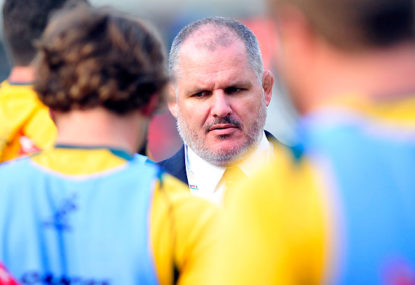LISTEN: 'You lost the league!' Everton fans troll Liverpool after denting Reds' title hopes
Everton won the Merseyside derby 2-0, with Toffees supporters taunting Liverpool after the game at their home ground Goodison Park.

The career of a professional sports coach is complex, and fraught with uncertainty.
When things are going badly, the fans and press will be calling for your head, or rumours of player unrest could result in the team questioning your authority.
And even when everything is going well, you never know when a new CEO will come in and replace you with their preferred option.
Trying to make sense of the recent number of coaching upheavals in Australian sport, I wanted to look at how fragile existence is for top-level coaches in various leagues around the world.
In my own brief yet illustrious coaching career I did not have to deal with any the issues they faced, but more about that later.
When most people think of the precarious nature of being a sports coach, their minds turn immediately to football.
Since the football season started in August, twenty managers have left their posts in England’s top five divisions (Premiership, Championship, League 1, League 2 and Conference), and the Scottish Premier League. Six of them were sacked, seven left by mutual consent, and the other seven resigned.
An excellent article by Sue Bridgewater on Football Perspectives gave some statistics on the longevity of managers in England’s top four divisions.
The average tenure of dismissed managers in 1994-95 was 2.55 seasons. By season 2013-14 it was 1.44 seasons, showing how the managerial game is becoming even more fickle as the interest and scrutiny of the league increases.
West Ham United is a good example of how the demands on managers have changed over time. For the first 100 years of their existence (1901-2001), they had just eight permanent managers, averaging 12.5 seasons per manager. In the last 14 years seasons they’ve had seven (including Trevor Brooking, who acted as a caretaker manager for 16 games in 2003), each manager averaging just 1.42 seasons in the job.
It’s not just football managers in England who get a rough deal though. In the heavily scrutinised environment of American professional sports, coaches are on a short shrift to nothing. USA Today did a study in 2012, looking at the five most recent managers of every franchise in the USA’s major leagues and their average tenures.
It did not make for pretty reading.
When I was a coach (assistant coach that is, of my cousin’s under 11-13 boys football team – but let’s not let facts get in the way of me making a point), I rarely had to deal with the problems most coaches do.
I never had to deal with a serious long-term injury to our equivalent of Garry Ablett Jr like Guy McKenna did at the Suns.
I never “struggled to retain the level of respect from the playing group” Ewen McKenzie assumed he had after the Kurtley Beale saga. Probably because you very rarely, if ever, have any level of respect from a group of 12-13 year old boys in Essex.
Whenever my “message wasn’t getting through” to the players, and it resulted in a poor result, I just assumed it was their fault, unlike the Melbourne United board and Chris Anstey.
As for QPR manager Harry Redknapp’s problem of having to deal with his unfit striker, Adel Taarabt, whom Redknapp recently suggested was three stone (20kg) overweight? Well none of our players were earning £60-70K ($110-130K) per week (as far as I was aware), so we couldn’t flog them for having the odd cake or two after training.
So despite my obvious success, why am I not still coaching? Well, much like McKenzie, murmurings of club political uncertainty forced me to choose to exit stage left with my dignity intact. Either that or I left while the going was good – it’s hard to remember the exact details – I’ll be sure to reveal more in my book.
The statistics don’t lie. Coaching is a tough gig, and I take my hat off to anyone willing to give it a go.